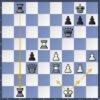Batumi, Georgia – In a narrative that reads less like a typical chess tournament report and more like a heroic epic, Divya Deshmukh, a mere 19-year-old from India, has captivated the global chess community by storming into her first FIDE Women`s Chess World Cup final. This isn`t just a story of nascent talent; it`s a profound testament to unwavering composure, strategic brilliance, and the relentless spirit of a rising star who has systematically dismantled higher-ranked opponents and defied all expectations.
The Ascent of a Giant Slayer
Divya`s journey to the final has been nothing short of spectacular. Carrying the title of International Master – though whispers within the chess fraternity suggest Grandmaster status is an imminent formality – she arrived at the World Cup as the 15th seed. Her path was fraught with formidable challenges, yet she navigated it with a maturity far beyond her years. Along the way, she orchestrated a series of upset victories that sent ripples through the competition:
- She decisively overcame second seed Zhu Jiner, a formidable opponent whose reputation precedes her.
- She triumphed against her higher-ranked compatriot, Harika Dronavalli, a seasoned player on the international circuit.
- Her most recent conquest was against former World Champion and third seed, Tan Zhongyi of China, in a grueling semifinal clash.
Each victory underscored Divya`s ability to not only contend with, but decisively defeat, the established elite of women`s chess, proving that rank is sometimes just a number on a list.
Records Shattered, History Written
With her qualification for the final, Divya has etched her name into the annals of chess history. She now holds the distinction of being the youngest finalist ever in the Women`s World Cup, surpassing Nurgyul Salimova`s record from the previous edition. Furthermore, she joins Salimova as one of only two International Masters to reach this prestigious final – a testament to a playing style that clearly transcends her current rating.
This remarkable achievement comes just a year after securing individual and team gold medals at the FIDE Olympiad, solidifying her status as one of India`s brightest chess prospects. Beyond the immediate glory of the World Cup final, Divya`s performance has secured her a coveted spot in next year`s Candidates Tournament. This is no mere consolation prize; it`s the direct pathway to challenging for the Women`s World Championship title – a dream now within tangible reach for the young prodigy.
The Semifinal Epic: A Battle of Wills and Nerves
The semifinal against Tan Zhongyi offered a dramatic display of competitive chess, a true test of endurance and nerve. After a relatively swift draw in the first game where Divya held her own with the black pieces, the second game escalated into a nail-biting encounter. The opening saw no clear advantage for either player, but Divya soon found herself in time trouble during the complex middlegame. At one point, around move 30, engine evaluations suggested Zhongyi held a distinct advantage, prompting a few anxious moments among her supporters.
However, the narrative of the game pivoted dramatically through a series of tactical inaccuracies by Zhongyi between moves 32 and 35. This opened a window for Divya, who then capitalized, gaining a significant edge. Yet, the drama wasn`t over. A subsequent inaccuracy from Divya on move 79 brought the position back to an almost dead level, testing the resilience of both players. It was a moment where many, especially a player of her relative inexperience against a former world champion, might have crumbled under the immense pressure.
But as the old adage goes, fortune favors the bold, or in this particular case, the relentlessly persistent. This new wave of Indian chess talent seems to operate under a different philosophical principle: to keep pushing, regardless of the clock or the shifting tides of advantage. And so Divya pushed, even with her opponent having a considerable time advantage. On move 90, Zhongyi delivered the decisive blunder. From that point, Divya played with unwavering precision, sealing her place in the final. While the purists might nitpick the `cleanliness` of her victory, comparing it to an engine`s faultless execution, history books, unlike chess engines, rarely record the precise ELO advantage at move 30. They remember the outcome, and this outcome is historic.
What Lies Ahead: An All-Indian Dream?
Divya Deshmukh now awaits the outcome of the other semifinal tie-breaker, which will pit another Indian chess icon, Koneru Humpy, against China`s Lei Tingjie. The prospect of an all-Indian Women`s Chess World Cup final is a tantalizing thought – a testament to the burgeoning strength of Indian chess on the global stage, proving their depth of talent.
Regardless of who she faces, Divya has already secured her legacy in this tournament. Her composure under pressure, her tactical acumen, and her indomitable fighting spirit have marked her as a player to watch for years to come. For a sport often characterized by quiet contemplation, Divya Deshmukh`s performance has been nothing short of a roar – a clear message that a new generation has arrived, ready to redefine the boundaries of the game and perhaps, even its champions.











